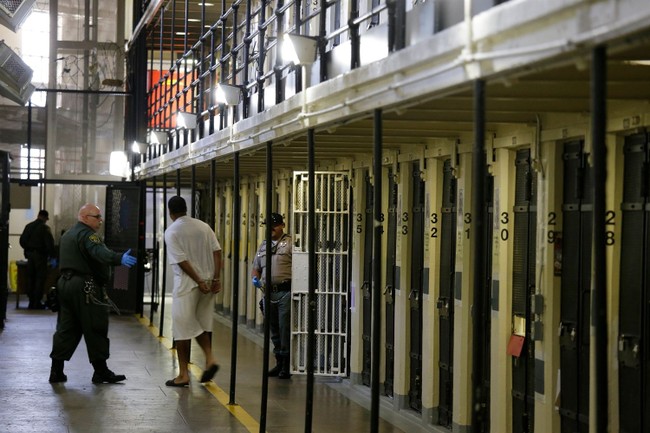
We’ve written extensively about the push to treat “gun violence” as a public health issue (or, in many cases, an epidemic), but I confess that I’d never heard the phrase “gun addiction” until I ran across a report about a program at San Quentin Rehabilitation Center called “Arms Down”. The program is described as a self-help organization started by prisoners that also has an outreach component aimed at preventing the use of firearms in violent crimes and personal disputes.
Advertisement
It’s an interesting concept, but I’m still puzzled by the notion of a firearms addiction, which seems to me a way of absolving these inmates of their own actions, or at least deflecting some responsibility away from them.
“This is San Quentin’s first firearm awareness group,” said Lt. Guim’Mara Berry, the prison’s public information officer. “I hope it spreads to all 32 CDCR institutions.”
In the last six months, Arms Down participants have engaged in dialogue with each other to examine subjects such as their first traumatic experience and their first involvement with a firearm.
“I’m blown away by what’s happening here,” said state Assemblymember Damon Connolly, D-San Rafael. He attended an Arms Down meeting in May. “I’m really impressed that San Quentin is taking the lead by creating a program for those who’ve used a gun — to better understand why they used guns, and the impacts. And just as importantly, how to impact society, and particularly the youth in breaking the cycle.”
If Connolly recognizes the value of Arms Down in stopping the cycle of violence, can he aslo admit the worthlessness of California’s gun control laws? After all, if the state’s restrictions worked as well as anti-gun politicians claim, then none of these inmates would have been able to access a firearm to begin with.
Advertisement
“This is something that’s needed across America,” said Jemain Hunter, Arms Down founder and chairperson.
He said the group was started because other self-help programs did not help him, and to help others understand why they carried guns in the first place.
To approach firearms as an addiction, Hunter built Arms Down similar to Alcoholics Anonymous and Narcotics Anonymous. Because everyone carried guns for different reasons, he often “shut down” in other self-help programs because he wanted to understand his reasons for carrying a firearm.
The program’s curriculum presented each participant with insightful questions so they will look inside themselves to ask, “What made it alright for you to carry a concealed weapon?” and “When having a firearm in your possession, did you feel complete?”
“My gun was part of my survival,” said Sammie Nichols. At Arms Down, he learned to challenge his belief system, and what it means to be a man. “We’ve got to start retraining ourselves. We’ve got to be part of the solution.”
“One night I decided to carry a gun,” said Damon Lewis, who emceed the graduation. “It was normal.” He said it was part of what he learned from his father, and that inter-generational normalization may have led to his daughter’s incarceration.
Okay, but carrying a gun is normal; maybe not in some parts of California, but certainly in most of the U.S. There are more than 20 million Americans with a concealed carry license, and millions more carrying in states where no license or permit is needed to lawfully bear arms. I don’t know why Lewis’s daughter wound up behind bars, but if it was solely for bearing arms without a California carry permit I’d argue she should never have been incarcerated. If, on the other hand, her stint in prison was the result of her actions with a gun, then it wasn’t the normalization of carrying that was the issue.
Advertisement
Other aspects of the Arms Down curriculum, developed by group members, examine male false-belief systems about manhood, carrying a gun for “protection,” pulling the trigger, alternatives to firearms, and lessons that teach self love, respect, the value of life, and how to forgive.
“I wanted to highlight why Arms Down is different,” said Muhammad Fasih, who spoke at an earlier meeting. He is the group’s sponsor and San Quentin’s Muslim chaplain. “What we want to create is a group that addresses people who went to guns to resolve their issues.”
“We are not against the Second Amendment,” Fasih said at the Arms Down graduation. He agreed with the group’s premise and said, “There is a gun addiction in this country.”
Look, I’m happy to see these inmates engage in some self-reflection about the actions that led to their incarceration, and if it helps others to avoid the same fate then all the better. But we don’t have a “gun addiction” in this country. Most violent crime is committed by a very small percentage of the population, which means the individuals Fasih works with behind bars are the exception, not the rule when it comes to gun owners (both legal and illegal).
I agree that carrying a gun doesn’t automatically make you a man (just ask any woman who owns a gun), any more than owning a gun demonstrates a lack of respect for the value of life. If those inmates who used a gun to violently resolve their issues need to be reminded of that, great, but let’s quit with the delusion that their acts of violence are the result of an addiction to guns.
Advertisement

